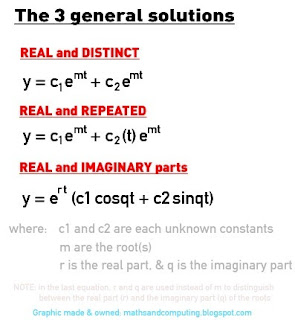y'' + 2y' + 3y = 0
2y'' - y' - 6y = 0
y'' - 3y' - y = 0
Simply follow these steps:
1) Rewrite the equation in terms of 'm', and for each (') count as a power (ie. ' -> x1)
2) Now find the roots (or find a value for m). You can do this by either:
a) splitting the middle term then factorising, or
b) use the quadratic equation

3) Now you must 'sub' those roots into one of the three 'general solutions.' Which equation you must use is dependant on what your roots (m) are.
If roots are REAL and DISTINCT: use y = c1 emt
If roots are REAL but THE SAME: use y = c1 emt
If roots have a REAL part and an IMAGINARY part: use y = ert
Then you have the general solution.
EXAMPLE
Find the general solution of y'' + 2y' - 3y = 0
1) m2
2) You can use either method (a) or (b) to find the roots. Both are shown:
a) a=1, b=2, c=-3
The two numbers 3 and -1 will add to b and multiply to c
m2
m(m-1)+3(m-1) = 0
(m+3)(m-1) = 0
m=-3, 1
b) Using the quadratic equation, the outcome is m=-3 or m=1
3) Roots (m) are REAL and DISTINCT.
So... use y=c1 emt
Sub in m=-3 and 1: y = c1 e-3t
That is the general solution!
No comments:
Post a Comment